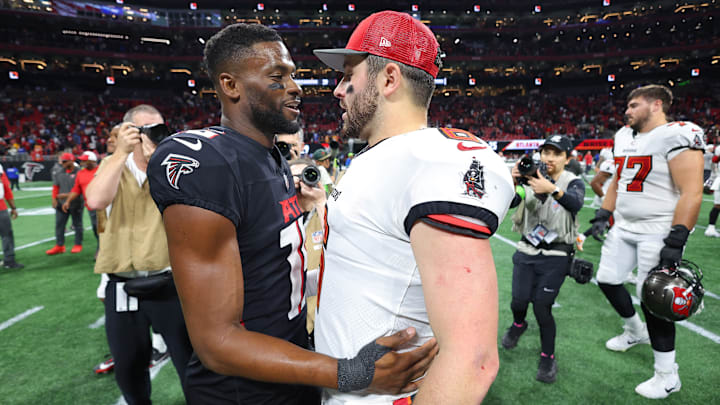In the NFL, parity and change are prominent factors and can affect every team each season, regardless of the previous season's success.
For the most part, the Tampa Bay Buccaneers have managed to avoid parity in terms of success within the NFC South. The Bucs have won the last three division titles with a combined record of 30-21 dating back to 2021.
Not too shabby.
Before Tampa Bay's stretch of division titles, New Orleans was the dominant team in the South. From 2017-2020, the Saints won four straight division titles with a 49-15 combined record and three playoff wins. In the seven-year stretch from 2007 to 2016, both Atlanta and Carolina enjoyed prominent success, with the Falcons and Panthers winning six of the eight division crowns, and each of them reached the Super Bowl in 2015 and 2016.
The lack of parity and change in the NFC South is a clear outlier from the rest of the league, as at least one team has won its division after finishing last or tied for last the previous season in 19 of the last 21 seasons. In 2023, Baltimore, Houston, Dallas, and Detroit were the four teams to accomplish this feat, with the Texans going from worst to first in the AFC South.
This season, however, the NFC South may see a new team win the division for the first time in four seasons. Although the Bucs may repeat for the fourth straight season, these are the reasons that Tampa Bay may falter in their efforts to do so.
3 Reasons Buccaneers might not repeat as NFC South Champs in 2024
Lack of external moves comes back to bite them
After winning the NFC South and advancing to the NFC Divisional round, Tampa Bay's mentality this offseason was to “run it back” next season. For the most part, the Buccaneers retained their key stars in free agency and added seven key rookies without any major losses on either side of the ball. In that, Tampa Bay enters 2024 with one of the most well-rounded rosters in recent memory, led by second-year quarterback Baker Mayfield.
While this free agency class didn't have the most impactful players available, Tampa Bay still had over $45 million in cap space and didn't land any major signings. The Bucs' best signing was a two-year, $9 million deal with Jordan Whitehead, who returns to Tampa Bay after spending his first four seasons in the league as a Buccaneer.
Outside of that, Tampa Bay used their cap space scarcely with modest signings, including offensive linemen Ben Bredeson, Sua Optea, and Justin Skule, cornerbacks Bryce Hall and Tavierre Thomas, and wide receiver Sterling Shepard. Those moves are good on their own, but none are likely to make the Bucs a championship-caliber team in 2024.
Meanwhile in the NFC South, Atlanta took a different approach to the offseason than Tampa Bay. With a 7-10 mark last season under arguably the worst quarterback play in the league, the Falcons went all-in on getting a proven quarterback, signing veteran Kirk Cousins to a four-year, $180 million contract. Atlanta later drafted former Washington Husky Michael Penix with the No. 8 pick in the draft to have two solid options under center this season.
Excluding Cousins and Penix, Atlanta managed to add more talent to their offense and defense, highlighted by signing Darnell Mooney to a three-year, $30 million deal and trading Desmond Ridder for Rondale Moore from Arizona. With Drake London, Bijan Robinson, Tyler Allgeier, and Kyle Pitts all returning in 2024, along with offensive linemen Jake Matthews and Chris Lindstrom, Atlanta's offense may clear Tampa Bay's offense as the best in the division.
Besides a clear upgrade in their roster, Atlanta parted ways with head coach Arthur Smith, who posted a 21-30 record in three seasons as head coach. In his place, the Falcons hired Raheem Morris, the former Los Angeles Rams defensive coordinator and former Falcons assistant and interim head coach, who figures to be a clear upgrade over Smith.
For Tampa Bay, continuity felt like the right decision to make this offseason, and oftentimes it yields success. In this case, spending more money to have added one of the top free agents would have been the right call for Tampa Bay to keep pace with Atlanta in the NFC South division race, especially after barely getting past Atlanta last season.
